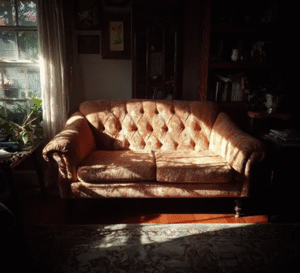The Secret Inside Grandma’s Old Couch

When I moved into my grandmother’s house to care for her during her final months, I believed I was stepping into a chapter of farewell — a time for comfort, compassion, and closure. I never imagined that, years later, an old piece of furniture from her living room would change how I understood love, inheritance, and the quiet ways family leaves us pieces of themselves.
If anyone had told me that an aging, peach-colored couch would become my most treasured possession, I might’ve smiled politely and dismissed it. After all, it sagged in the middle, smelled faintly of lavender and time, and had seen better days. But that couch, with its faded roses and worn arms, was about to tell me one last story — one my grandmother had hidden carefully, waiting for the right hands to uncover it.
The Woman Who Raised Me
My grandmother, Mabel, wasn’t just my grandmother. She was my anchor, my teacher, my first home. My mother, Clara, was too restless for motherhood. She spent most of my childhood chasing a life that shimmered in travel brochures — cruises, parties, fleeting romances. While she pursued her freedom, Mabel filled every empty corner of my life.
She never made a fuss about it. She simply was there.
When I had nightmares, it was her hand that soothed me back to sleep.
When I failed my first math test, it was her laughter that turned my tears into courage.
She made the best cinnamon donuts I’ve ever tasted — fried golden, sprinkled with sugar, and always served with a kiss on the forehead.
She had a way of making love feel like air — invisible but necessary for life itself.
So when the diagnosis came — late-stage cancer — there was never a question in my mind. I packed up my two children, took unpaid leave from work, and moved into her little yellow house with creaky floors and hydrangeas that grew wild against the fence. It wasn’t a burden. It was the least I could do.
Goodbyes and Greed
My mother called once from her trip through Europe. “You always were the sentimental one, Lila,” she sighed when I told her about Grandma’s decline. “Hospitals make me miserable. You can handle this.”
And so I did. I bathed Mabel, brushed her silver hair, read her favorite novels aloud, and held her hand through restless nights. She spoke often — not about pain, but about life. About love that endures, about mistakes she wished she could undo, and about how proud she was of me. I didn’t know those would be the last conversations we’d share.
When she passed quietly one soft autumn morning, the air felt hollow. Her favorite teacup still sat half full on the bedside table. The hydrangeas outside were turning brown.
Three days later, Clara finally arrived — tanned, perfumed, and unbothered. “So,” she said to the lawyer, “what’s the situation with the house? The jewelry?”
The reading of the will was short. The house, the savings, the belongings — all went to my mother. There was one small item left for me: the peach-colored parlor couch.
Clara laughed out loud. “You always were attached to sentimental junk.”
But I knew better. Mabel never did anything without purpose.

The Discovery
Marcus, my oldest friend, helped me move the couch into my small living room. We set it against the window, and when I ran my hands along the fabric, memories flooded back — the smell of her perfume, the sound of her laughter, the weight of her comfort during childhood heartbreaks.
A few days later, I decided to clean the couch properly. As I pulled off the cushions, I noticed something odd — a seam that didn’t quite match the others. My fingers found a small, hidden zipper tucked beneath the middle cushion.
Inside, wrapped in old velvet, was a black pouch. My breath caught. Within it were several tiny jewelry boxes and an envelope marked simply: “For Lila.”
The handwriting — slanted, graceful, familiar — made my eyes sting. I unfolded the letter slowly, afraid the paper might crumble.
The Letter
My darling Lila,
If you’re reading this, you’ve found my secret. I wanted you to have what truly belongs to you — the jewels that came from my grandmother and her mother before her. Your mother has always seen only the glitter, never the meaning. But you, my dear, understand value in a way money cannot measure.You cared for me without expectation, loved me without condition, and stood beside me when I could no longer stand for myself. These pieces are yours, not as riches, but as reminders of what love builds — generation by generation.
One day, give them to your Elsie, and tell her they were earned through kindness, not inheritance.
I love you endlessly.
– Granny M.
Inside the velvet bag lay treasures I’d never seen — delicate pearls, a pair of emerald earrings that gleamed like green fire, and a diamond brooch shaped like a lily. Each piece caught the light softly, as though glowing with her spirit.
I pressed the letter to my chest and wept. It wasn’t the jewels that broke me open — it was knowing she had trusted me to find them. To understand them.
The Life That Followed
I never told Clara. I didn’t need to. She wouldn’t have believed me, and even if she had, she wouldn’t have cared for the meaning behind it. The couch stayed in my home — a little worn, a little sagging, but loved. It became the heart of our evenings — the place where my children did homework, where we shared popcorn on movie nights, and where I often sat late into the night reading Mabel’s letter again and again.
One quiet evening, I dressed in a simple black dress I hadn’t worn since before the children were born. I put on the emerald earrings from the velvet bag. For the first time in a long time, I saw someone strong and radiant looking back at me in the mirror — someone shaped by love, loss, and legacy.
Marcus dropped by, holding a bag of groceries. He raised an eyebrow when he saw the earrings. “Going somewhere fancy, Lila?”
“Dinner with an old friend,” I smiled.
He nodded toward the couch. “Ever going to tell your mom?”
I shook my head. “No. Some things aren’t meant to be shared. Some are meant to be kept safe.”
He grinned. “Then I’d say you’ve already won.”
What Love Leaves Behind
Weeks later, I told the story to my friend Emma over tea. She gasped when I described the hidden zipper. “She hid it in the couch?”
“Yes,” I laughed. “Because she knew my mother would never look there. She always said the best secrets are the ones that sit in plain sight, waiting for the right heart to notice.”
That night, after tucking the kids into bed, I curled up on the couch again. The cushions smelled faintly of lavender — Mabel’s scent. I read her letter once more, tracing the curve of her signature with my fingertip.
“Thank you, Granny,” I whispered.
The house was quiet, but I could almost hear her humming — the same soft tune she used to sing while baking donuts. The couch felt warm beneath me, like it remembered.
Love, I realized, doesn’t vanish when a heartbeat stops. It hides — in letters, in laughter, in the seams of an old couch — waiting for us to find it when we need it most.
As I turned off the light that night, I caught the faint glimmer of the emerald earrings in their velvet box. They sparkled softly, like two green stars — quiet witnesses to a love that outlasted everything else.
And I smiled.
Because even now, Mabel was still here — tucked within the cushions, guiding me forward, as she always had.
